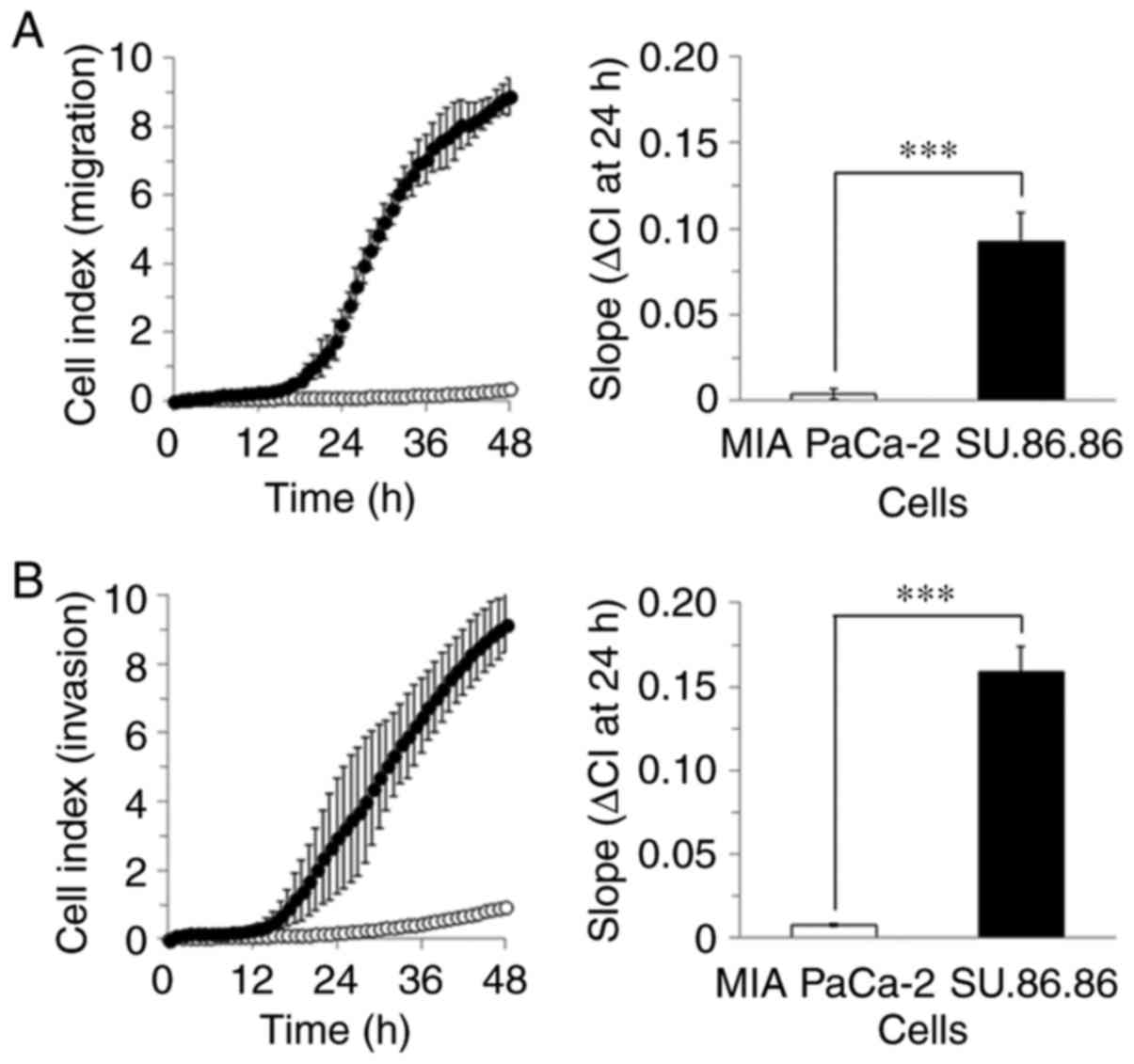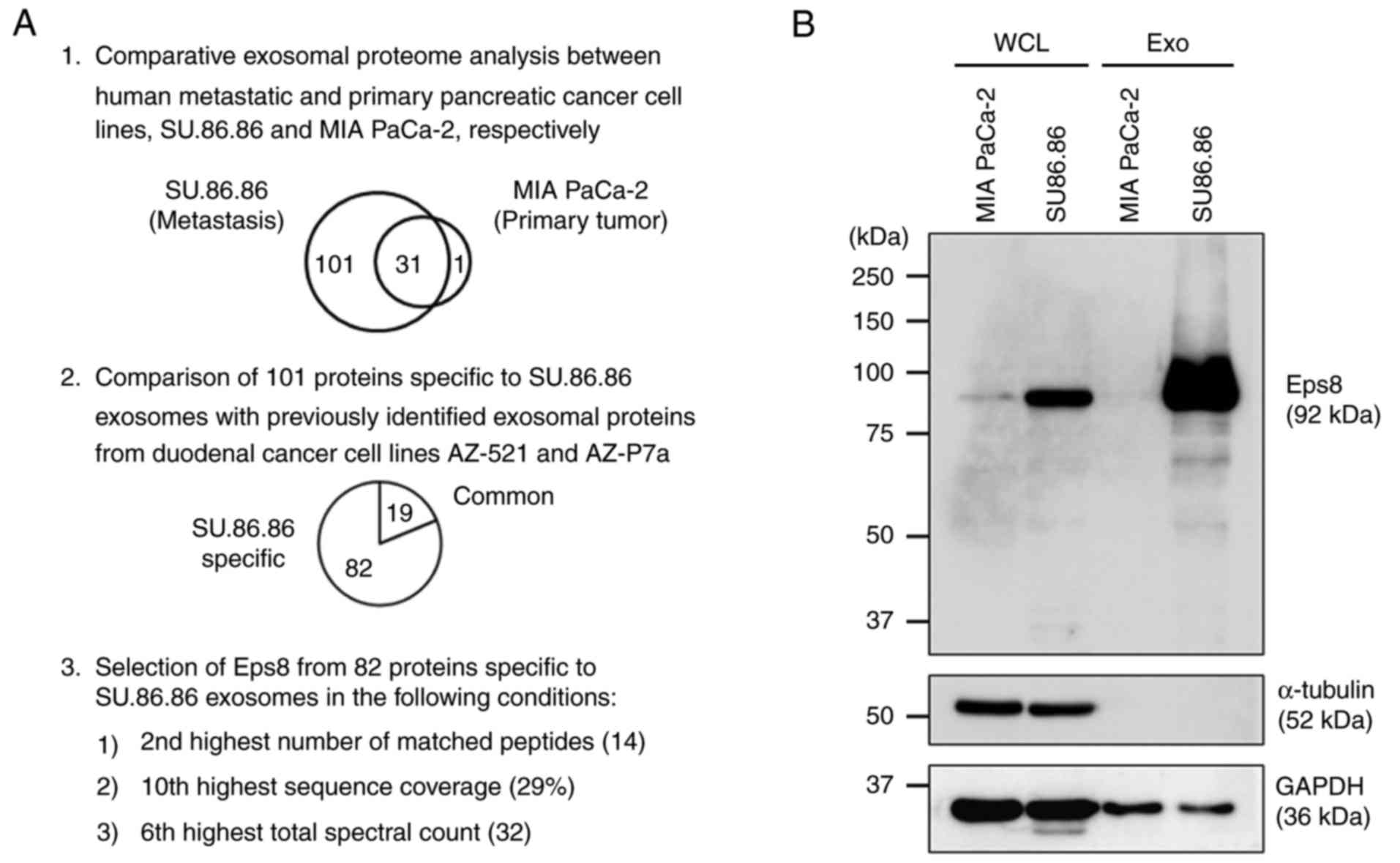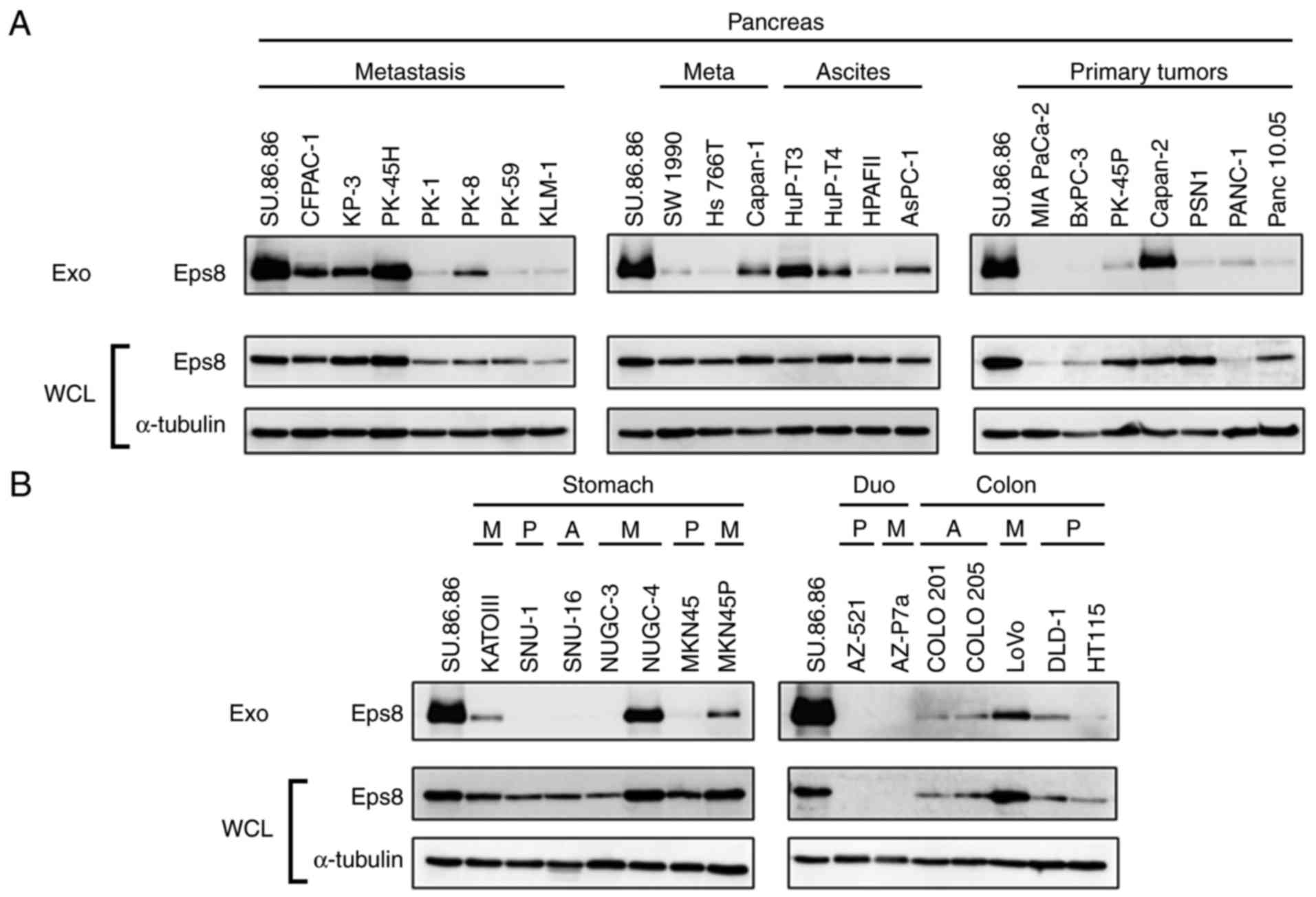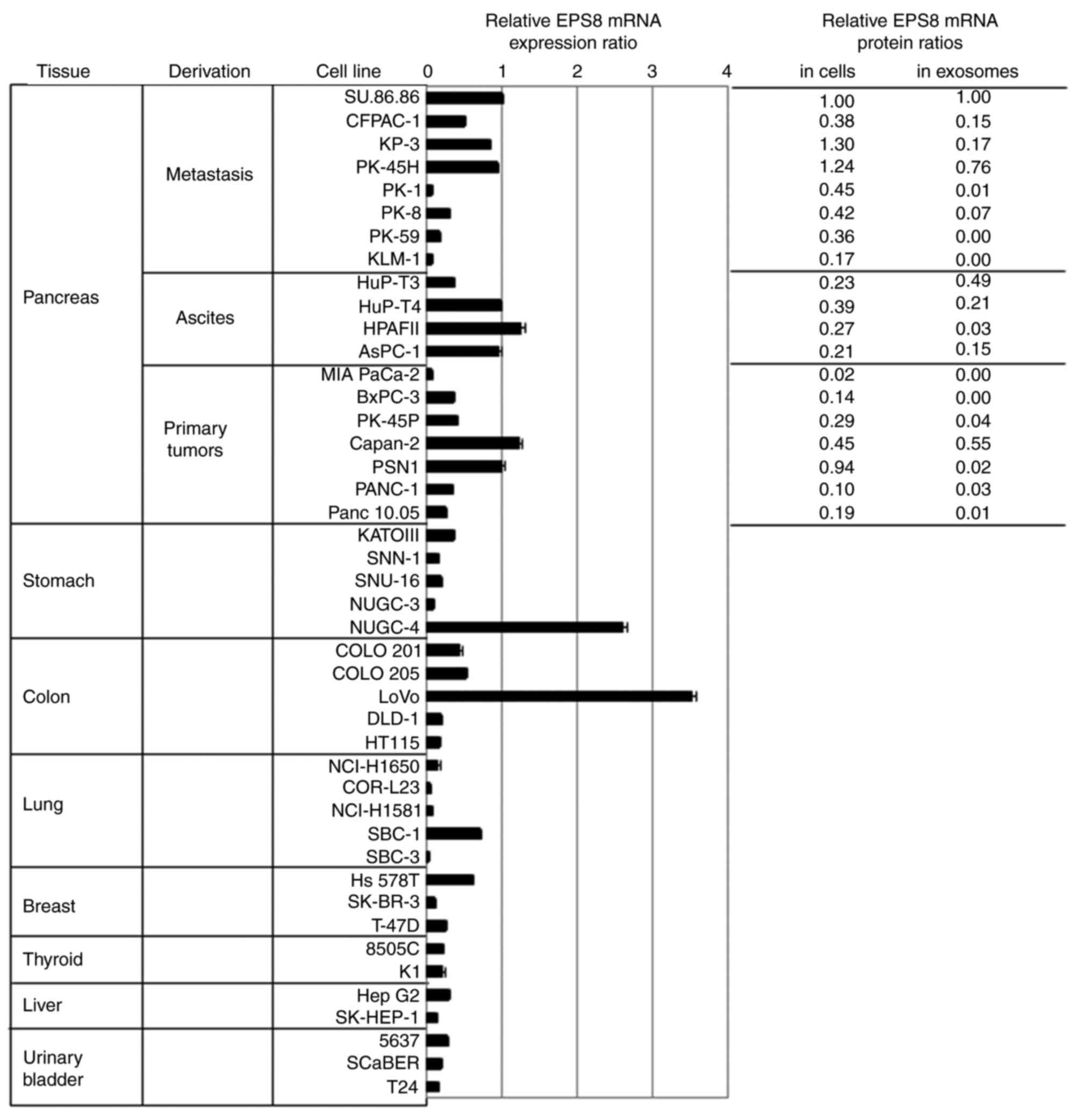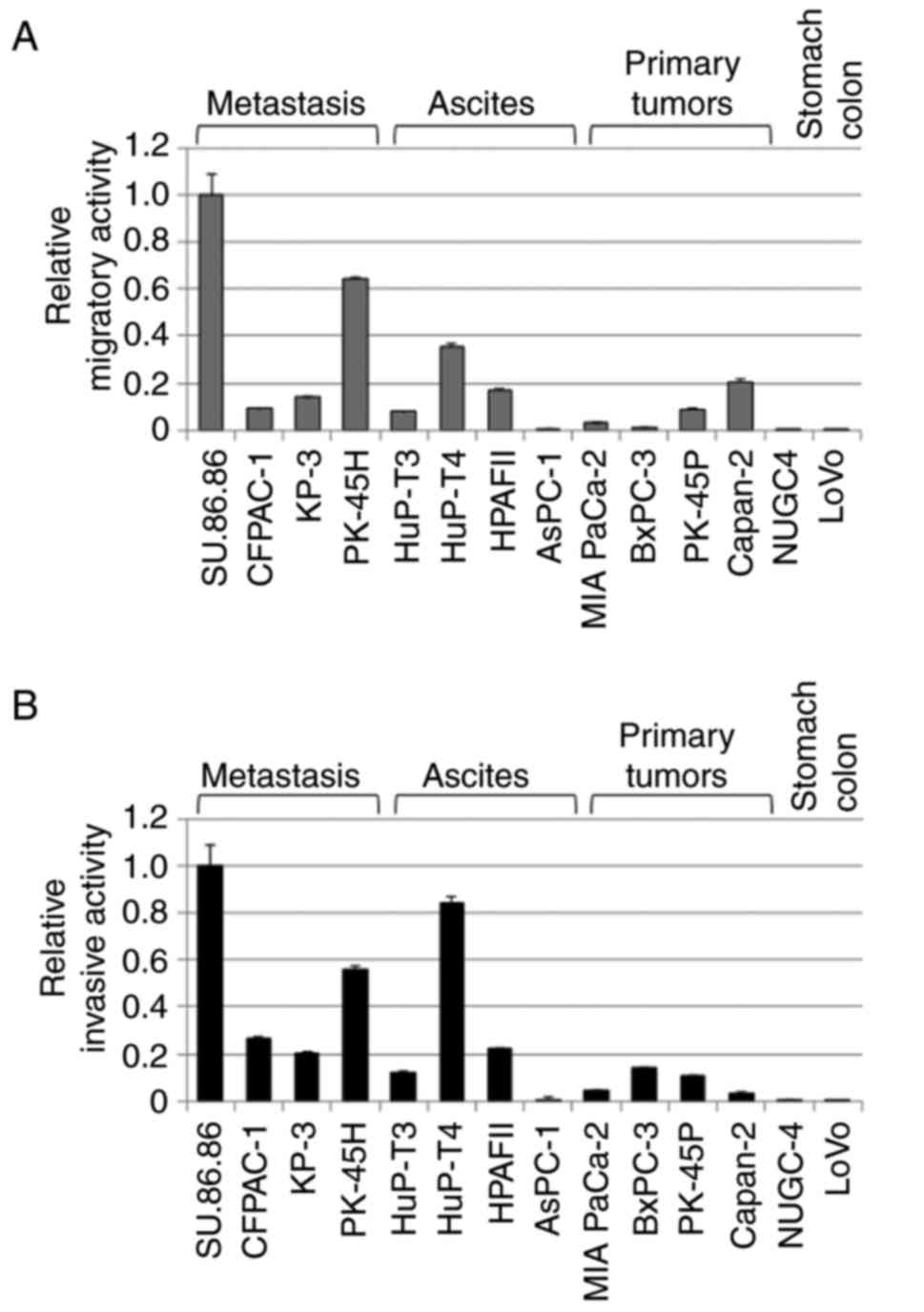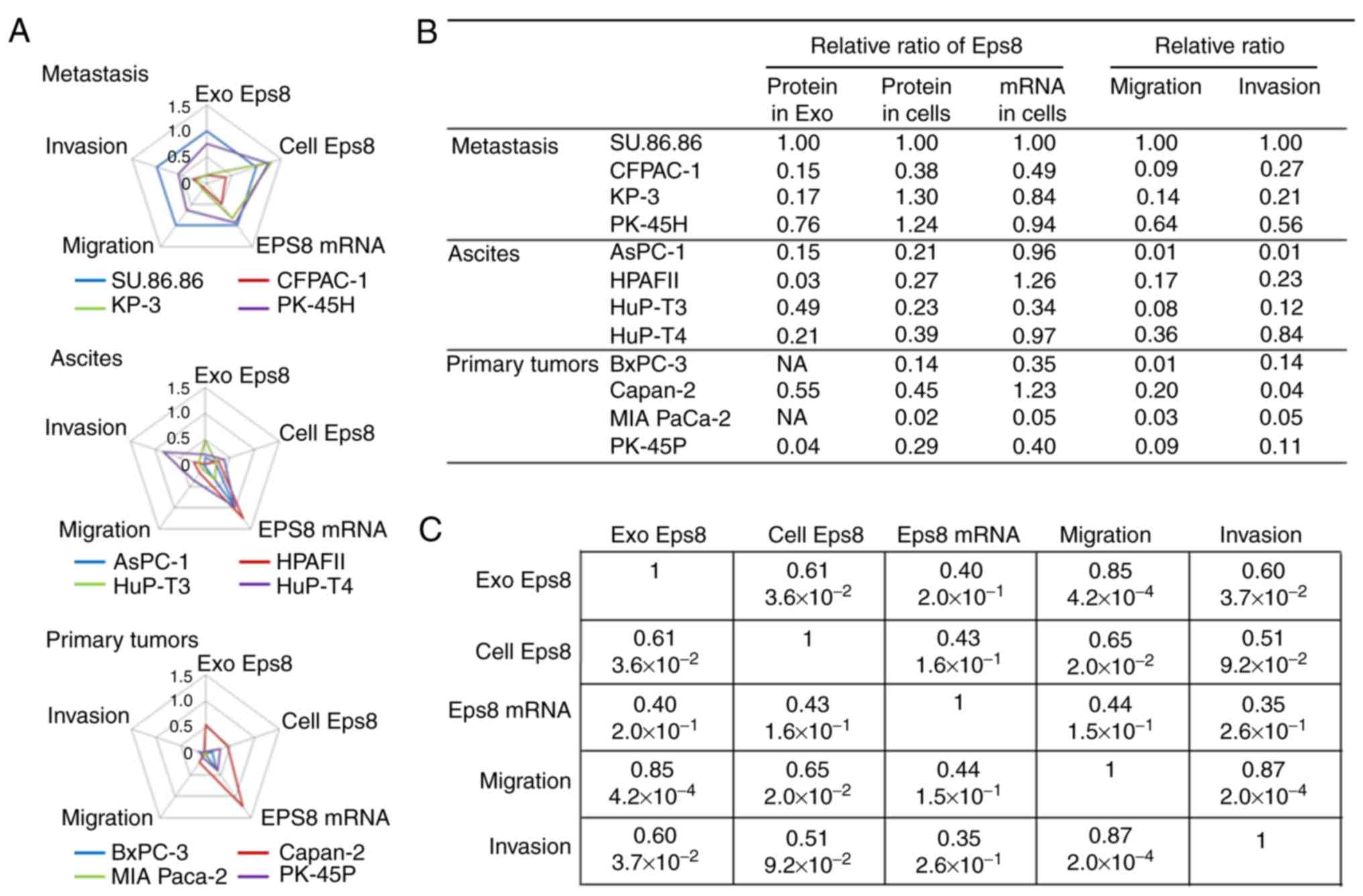|
1
|
Colombo M, Raposo G and Théry C:
Biogenesis, secretion, and intercellular interactions of exosomes
and other extracellular vesicles. Annu Rev Cell Dev Biol.
30:255–289. 2014. View Article : Google Scholar : PubMed/NCBI
|
|
2
|
Greening DW, Xu R, Gopal SK, Rai A and
Simpson RJ: Proteomic insights into extracellular vesicle
biology-defining exosomes and shed microvesicles. Expert Rev
Proteomics. 14:69–95. 2007. View Article : Google Scholar
|
|
3
|
Kalluri R: The biology and function of
exosomes in cancer. J Clin Invest. 126:1208–1215. 2016. View Article : Google Scholar : PubMed/NCBI
|
|
4
|
Soung YH, Ford S, Zhang V and Chung J:
Exosomes in cancer diagnostics. Cancers. 9:82017. View Article : Google Scholar :
|
|
5
|
Choi DS, Kim DK, Kim YK and Gho YS:
Proteomics, transcriptomics and lipidomics of exosomes and
ectosomes. Proteomics. 13:1554–1571. 2013. View Article : Google Scholar : PubMed/NCBI
|
|
6
|
EL Andaloussi S, Mäger I, Breakefield XO
and Wood MJ: Extracellular vesicles: Biology and emerging
therapeutic opportunities. Nat Rev Drug Discov. 12:347–357. 2013.
View Article : Google Scholar : PubMed/NCBI
|
|
7
|
Siegel RL, Miller KD and Jemal A: Cancer
statistics, 2017. CA Cancer J Clin. 67:7–30. 2017. View Article : Google Scholar : PubMed/NCBI
|
|
8
|
Ferlay J, Partensky C and Bray F: More
deaths from pancreatic cancer than breast cancer in the EU by 2017.
Acta Oncol. 55:1158–1160. 2016. View Article : Google Scholar : PubMed/NCBI
|
|
9
|
Hanada K, Okazaki A, Hirano N, Izumi Y,
Teraoka Y, Ikemoto J, Kanemitsu K, Hino F, Fukuda T and Yonehara S:
Diagnostic strategies for early pancreatic cancer. J Gastroenterol.
50:147–154. 2015. View Article : Google Scholar : PubMed/NCBI
|
|
10
|
Nuzhat Z, Kinhal V, Sharma S, Rice GE,
Joshi V and Salomon C: Tumour-derived exosomes as a signature of
pancreatic cancer-liquid biopsies as indicators of tumour
progression. Oncotarget. 8:17279–17291. 2017. View Article : Google Scholar : PubMed/NCBI
|
|
11
|
Le Large TYS, Bijlsma MF, Kazemier G, van
Laarhoven HWM, Giovannetti E and Jimenez CR: Key biological
processes driving metastatic spread of pancreatic cancer as
identified by multi-omics studies. Semin Cancer Biol. 44:153–169.
2017. View Article : Google Scholar : PubMed/NCBI
|
|
12
|
Sasaki K, Sato K, Akiyama Y, Yanagihara K,
Oka M and Yamaguchi K: Peptidomics-based approach reveals the
secretion of the 29-residue COOH-terminal fragment of the putative
tumor suppressor protein DMBT1 from pancreatic adenocarcinoma cell
lines. Cancer Res. 62:4894–4898. 2002.PubMed/NCBI
|
|
13
|
Ogura S, Kaneko K, Miyajima S, Ohshima K,
Yamaguchi K and Mochizuki T: Proneurotensin/neuromedin N secreted
from small cell lung carcinoma cell lines as a potential tumor
marker. Proteomics Clin Appl. 2:1620–1627. 2008. View Article : Google Scholar : PubMed/NCBI
|
|
14
|
Valadi H, Ekström K, Bossios A, Sjöstrand
M, Lee JJ and Lötvall JO: Exosome-mediated transfer of mRNAs and
microRNAs is a novel mechanism of genetic exchange between cells.
Nat Cell Biol. 9:654–659. 2007. View
Article : Google Scholar : PubMed/NCBI
|
|
15
|
Ohshima K, Kanto K, Hatakeyama K, Ide T,
Wakabayashi-Nakao K, Watanabe Y, Sakura N, Terashima M, Yamaguchi K
and Mochizuki T: Exosome-mediated extracellular release of
polyadenylate-binding protein 1 in human metastatic duodenal cancer
cells. Proteomics. 14:2297–2306. 2014. View Article : Google Scholar : PubMed/NCBI
|
|
16
|
Ohshima K, Inoue K, Fujiwara A, Hatakeyama
K, Kanto K, Watanabe Y, Muramatsu K, Fukuda Y, Ogura S, Yamaguchi K
and Mochizuki T: Let-7 microRNA family is selectively secreted into
the extracellular environment via exosomes in a metastatic gastric
cancer cell line. PLoS One. 5:e132472010. View Article : Google Scholar : PubMed/NCBI
|
|
17
|
Hatakeyama K, Ohshima K, Fukuda Y, Ogura
S, Terashima M, Yamaguchi K and Mochizuki T: Identification of a
novel protein isoform derived from cancer-related splicing variants
using combined analysis of transcriptome and proteome. Proteomics.
11:2275–2282. 2011. View Article : Google Scholar : PubMed/NCBI
|
|
18
|
Livak KJ and Schmittgen TD: Analysis of
relative gene expression data using real-time quantitative PCR and
the 2ΔΔCT method. Methods.
25:402–408. 2001. View Article : Google Scholar : PubMed/NCBI
|
|
19
|
Drucker BJ, Marincola FM, Siao DY, Donlon
TA, Bangs CD and Holder WD Jr: A new human pancreatic carcinoma
cell line developed for adoptive immunotherapy studies with
lymphokine-activated killer cells in nude mice. In Vitro Cell Dev
Biol. 24:1179–1187. 1988. View Article : Google Scholar : PubMed/NCBI
|
|
20
|
Yunis AA, Arimura GK and Russin DJ: Human
pancreatic carcinoma (MIA PaCa-2) in continuous culture:
Sensitivity to asparaginase. Int J Cancer. 19:128–135. 1977.
View Article : Google Scholar : PubMed/NCBI
|
|
21
|
Limame R, Wouters A, Pauwels B, Fransen E,
Peeters M, Lardon F, De Wever O and Pauwels P: Comparative analysis
of dynamic cell viability, migration and invasion assessments by
novel real-time technology and classic endpoint assays. PLoS One.
7:e465362012. View Article : Google Scholar : PubMed/NCBI
|
|
22
|
Welsch T, Endlich K, Giese T, Büchler MW
and Schmidt J: Eps8 is increased in pancreatic cancer and required
for dynamic actin-based cell protrusions and intercellular
cytoskeletal organization. Cancer Lett. 255:205–218. 2007.
View Article : Google Scholar : PubMed/NCBI
|
|
23
|
Fazioli F, Minichiello L, Matoska V,
Castagnino P, Miki T, Wong WT and Di Fiore PP: Eps8, a substrate
for the epidermal growth factor receptor kinase, enhances
EGF-dependent mitogenic signals. EMBO J. 12:3799–3808. 1993.
View Article : Google Scholar : PubMed/NCBI
|
|
24
|
Castagnino P, Biesova Z, Wong WT, Fazioli
F, Gill GN and Di Fiore PP: Direct binding of eps8 to the
juxtamembrane domain of EGFR is phosphotyrosine- and
SH2-independent. Oncogene. 10:723–729. 1995.PubMed/NCBI
|
|
25
|
Chen C, Liang Z, Huang W, Li X, Zhou F, Hu
X, Han M, Ding X and Xiang S: Eps8 regulates cellular proliferation
and migration of breast cancer. Int J Oncol. 46:205–214. 2015.
View Article : Google Scholar : PubMed/NCBI
|
|
26
|
Cattaneo MG, Cappellini E and Vicentini
LM: Silencing of Eps8 blocks migration and invasion in human
glioblastoma cell lines. Exp Cell Res. 318:1901–1912. 2012.
View Article : Google Scholar : PubMed/NCBI
|
|
27
|
Ding X, Zhou F, Wang F, Yang Z, Zhou C,
Zhou J, Zhang B, Yang J, Wang G, Wei Z, et al: Eps8 promotes
cellular growth of human malignant gliomas. Oncol Rep. 29:697–703.
2013. View Article : Google Scholar : PubMed/NCBI
|
|
28
|
Xu M, Shorts-Cary L, Knox AJ,
Kleinsmidt-DeMasters B, Lillehei K and Wierman ME: Epidermal growth
factor receptor pathway substrate 8 is overexpressed in human
pituitary tumors: Role in proliferation and survival.
Endocrinology. 150:2064–2071. 2009. View Article : Google Scholar : PubMed/NCBI
|
|
29
|
Yap LF, Jenei V, Robinson CM, Moutasim K,
Benn TM, Threadgold SP, Lopes V, Wei W, Thomas GJ and Paterson IC:
Upregulation of Eps8 in oral squamous cell carcinoma promotes cell
migration and invasion through integrin-dependent Rac1 activation.
Oncogene. 28:2524–2534. 2009. View Article : Google Scholar : PubMed/NCBI
|
|
30
|
Li Q, Bao W, Fan Q, Shi WJ, Li ZN, Xu Y
and Wu D: Epidermal growth factor receptor kinase substrate 8
promotes the metastasis of cervical cancer via the
epithelial-mesenchymal transition. Mol Med Rep. 14:3220–3228. 2016.
View Article : Google Scholar : PubMed/NCBI
|
|
31
|
Li YH, Xue TY, He YZ and Du JW: Novel
oncoprotein EPS8: A new target for anticancer therapy. Future
Oncol. 9:1587–1594. 2013. View Article : Google Scholar : PubMed/NCBI
|
|
32
|
Tod J, Hanley CJ, Morgan MR, Rucka M,
Mellows T, Lopez MA, Kiely P, Moutasim KA, Frampton SJ, Sabnis D,
et al: Pro-migratory and TGF-β-activating functions of αvβ6
integrin in pancreatic cancer are differentially regulated via an
Eps8-dependent GTPase switch. J Pathol. 243:37–50. 2017. View Article : Google Scholar : PubMed/NCBI
|
|
33
|
Uchima Y, Sawada T, Nishihara T, Maeda K,
Ohira M and Hirakawa K: Inhibition and mechanism of action of a
protease inhibitor in human pancreatic cancer cells. Pancreas.
29:123–131. 2004. View Article : Google Scholar : PubMed/NCBI
|
|
34
|
Peinado H, Zhang H, Matei IR, Costa-Silva
B, Hoshino A, Rodrigues G, Psaila B, Kaplan RN, Bromberg JF, Kang
Y, et al: Pre-metastatic niches: Organ-specific homes for
metastases. Nat Rev Cancer. 17:302–317. 2017. View Article : Google Scholar : PubMed/NCBI
|
|
35
|
Welsch T, Younsi A, Disanza A, Rodriguez
JA, Cuervo AM, Scita G and Schmidt J: Eps8 is recruited to
lysosomes and subjected to chaperone-mediated autophagy in cancer
cells. Exp Cell Res. 316:1914–1924. 2010. View Article : Google Scholar : PubMed/NCBI
|
|
36
|
Théry C, Zitvogel L and Amigorena S:
Exosomes: Composition, biogenesis and function. Nat Rev Immunol.
2:569–579. 2002. View
Article : Google Scholar : PubMed/NCBI
|
|
37
|
Théry C, Ostrowski M and Segura E:
Membrane vesicles as conveyors of immune responses. Nat Rev
Immunol. 9:581–593. 2009. View Article : Google Scholar : PubMed/NCBI
|
|
38
|
Yonemura Y, Endo Y, Yamaguchi T, Fujimura
T, Obata T, Kawamura T, Nojima N, Miyazaki I and Sasaki T:
Mechanisms of the formation of the peritoneal dissemination in
gastric cancer. Int J Oncol. 8:795–802. 1996.PubMed/NCBI
|
|
39
|
Nishimori H, Yasoshima T, Denno R,
Shishido T, Hata F, Okada Y, Ura H, Yamaguchi K, Isomura H, Sato N,
et al: A novel experimental mouse model of peritoneal dissemination
of human gastric cancer cells: Different mechanisms in peritoneal
dissemination and hematogenous metastasis. Jpn J Cancer Res.
91:715–722. 2000. View Article : Google Scholar : PubMed/NCBI
|
|
40
|
López-Terrada D, Cheung SW, Finegold MJ
and Knowles BB: Hep G2 is a hepatoblastoma-derived cell line. Hum
Pathol. 40:1512–1515. 2009. View Article : Google Scholar
|















